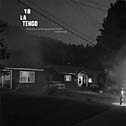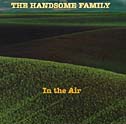








| |



|
|

This week:
Two couples contemplate light, darkness, and love; plus, Assorted Sound Bites
|
|

Comment
on this story
|
|
Yo La Tengo
And then nothing turned itself inside-out (Matador)
Ira Kaplan and Georgia Hubley—the lead couple and driving force behind the band Yo La Tengo—have never quite seemed at ease in the rock 'n' roll world, which has pretty much always belonged to young, audacious misfits.
Although they often get loud and discordant, Kaplan and Hubley have always had a more adult approach. Even at its noisiest, their music has had an air of sad maturity about it. Yo La Tengo's latest release, And then nothing turned itself inside-out, finds them looking back at a youth they probably found confusing and painful, and trying to make sense of an adulthood they've never really felt secure in.
For the most part, Yo La does away with the chaotic guitars, favoring its quieter side. This isn't really a radical departure for the group—they always bounced back and forth between these two extremes first pioneered by the Velvet Underground—but it makes for an even more contemplative record, and emphasizes Kaplan's and Hubley's beautiful, fragile voices.
Over soft strumming and slight drumming, Kaplan and Hubley look back at first romantic encounters, a rare venture out onto the dance floor in the disco era, and try to make sense of their relationship. In almost a whisper, Kaplan sings on "The Crying of Lot G," "You say that all we do is fight/ And I think, 'Gee, I don't know if that's true'/ And then I wonder, am I right, or is that part of our problem?"
Although these tunes are quite wistful, at times mournful, they're not self-indulgent or defeatist. Like mopey misfits finally grown up, Kaplan and Hubley search for happiness and answers in themselves and try to put their insecurities aside. On the tender "Night Falls on Hoboken," Kaplan moans, "Come on let's leave our misery/ And crawl toward where we want to be/ Can't we try?" His voice trails off, and what follows is 12 minutes or so of music, at turns raging, echo-y, slight, ethereal, firm—kind of the way dusk must sometimes feel in Hoboken, at least in Kaplan's mind.
Like the rest of the disc, the song is complex and torn, but there's also a recognition of the beauty and good that surrounds it. Maturity has never sounded so sweet.
—Joe Tarr
|
|

|
|
The Handsome Family
In the Air (Carrot Top)
At its deepest, darkest Appalachian roots, country music has always hinged on the tension between the hardships and heartbreaks of life here on earth and the Christian promise of a better life in Heaven. The Handsome Family, AKA spouses Brent and Rennie Sparks, seems to understand this far better than most slumming indie-rockers. Certainly the Sparks have indulged in the kind of romantic indie/country miserablism that leads to songs glamorizing cheap motels and blind drunkenness; their new album, In the Air, features two: "A Beautiful Thing" and "So Much Wine." But the best songs on the Chicago-based duo's fourth outing update the dread and ambiguity of country's base concerns for a world in which getting wasted sometimes seems the only thing left to do.
From its title on down, In the Air probes a secular version of the infinite ethereal barrier between earthly mud and suffering and some far-off paradise aloft. In the opening "Don't Be Scared," the sky offers comfort in the form of birds, winds, and falling seeds, and that same sky keeps pouring weather, wildlife, and other symbols throughout. The moon drives the longing protagonist of "The Sad Milkman" onto a rooftop in literal lunacy while "Lie Down" delves into the fatal pull of the terrestrial depths. The whole thing may sound overly serious, but the Sparks aren't so sober that they can't envision salvation arriving via Huey on "When That Helicopter Comes." And Brent Sparks' smooth baritone and the couple's evermore streamlined country minimalism make even the most lugubrious moments slip by with ease.
Oddly enough, In the Air is least interesting at its most traditional, such as the stately but saccharine "Grandmother Waits for You" and the "Knoxville Girl"-esque murder ballad "My Beautiful Bride." But when the Sparks conflate a fear of driving over bridges, flying dogs, and a girl "whose skin smelled like snow" into a hymn to breaking worldly bonds on the title track, they come up with a song that updates the tradition, twists it, and transcends it.
—Lee Gardner
|
|

|
|
Sound Bites
Nickel Creek
Nickel Creek (Sugar Hill)
Supposed to be: debut of hotshot bluegrass prodigies, produced by Alison Krauss. Is: as advertised, but dull. Chris Thile may be the fastest mandolin picker under the age of 20, Sara Watkins may be an intuitive fiddler with a lovely voice, but it all adds up to a tasteful, flaccid drone. C'mon Alison, let the kids play.
Sergent Garcia
Un Poquito Quema'o (Higher Octave)
French-Spanish Latin/dancehall reggae, with beats and attitude to spare. (Check out the dedication to Sub-commandante Marcos.) The best tracks shake, rattle, and roll like a trans-global hootenanny. Is it too early to declare a party record of the year?
Screwball
Y2K (Tommy Boy)
I could live a long time without hearing anyone say "my Gat splattaz niggaz" again. But Screwball's chunky gangsta grooves sure do move. Respect the beats, if not the b.s.
Small Faces
The BBC Sessions (BBC)
Two ways to hear this: seminal tracks from under-appreciated British rockers, or the birthplace of horrid white-boy blooz. I like their later pop ("Itchycoo Park," etc.) better than the sub-Who R&B that makes up most of this collection, but it's probably not really fair to hold Small Faces responsible for what came after. They just wanted to be Sam Cooke; it's not their fault BTO and Bad Company misread the blueprint.
(J.F.M)
|
|
|

March 9, 2000 * Vol. 10, No. 10
© 2000 Metro Pulse
|
|